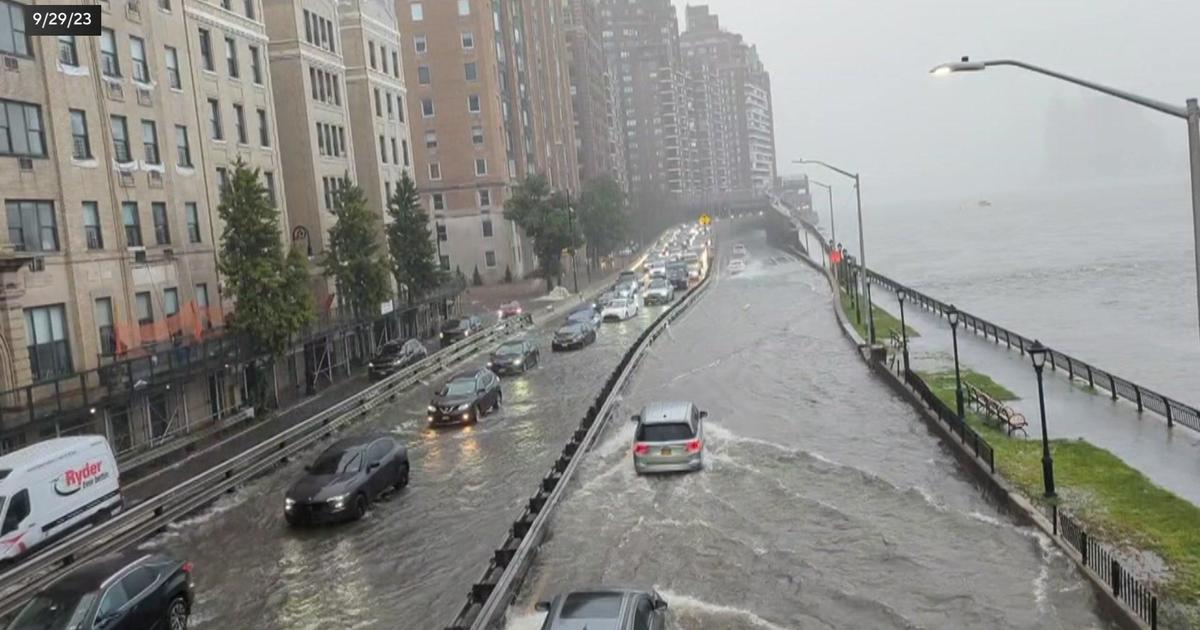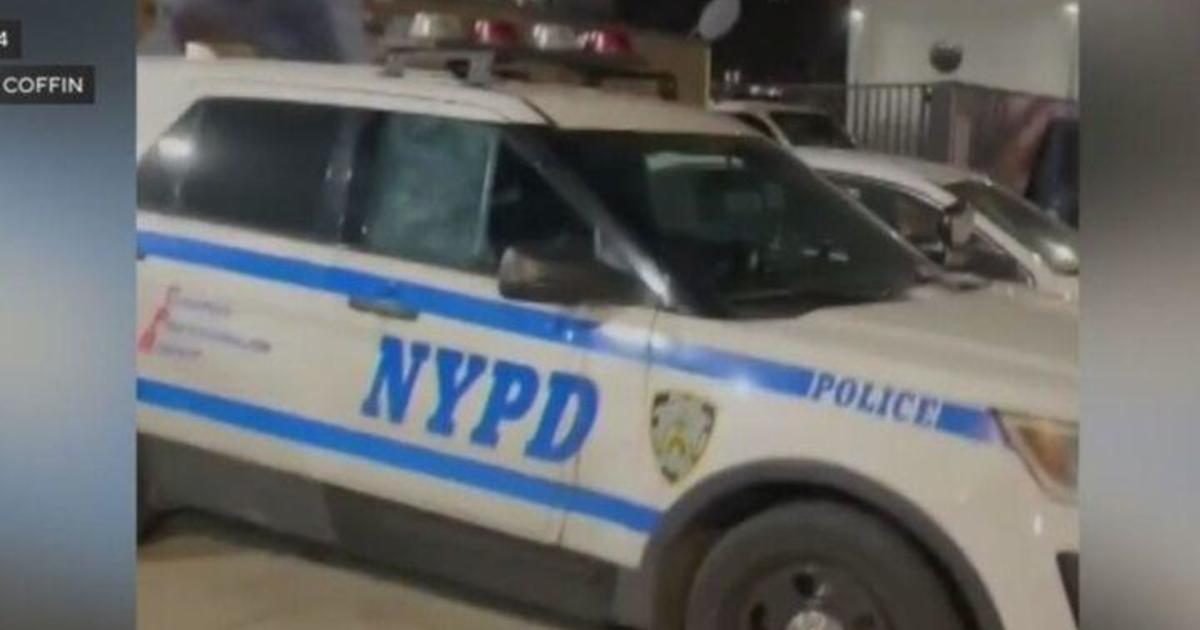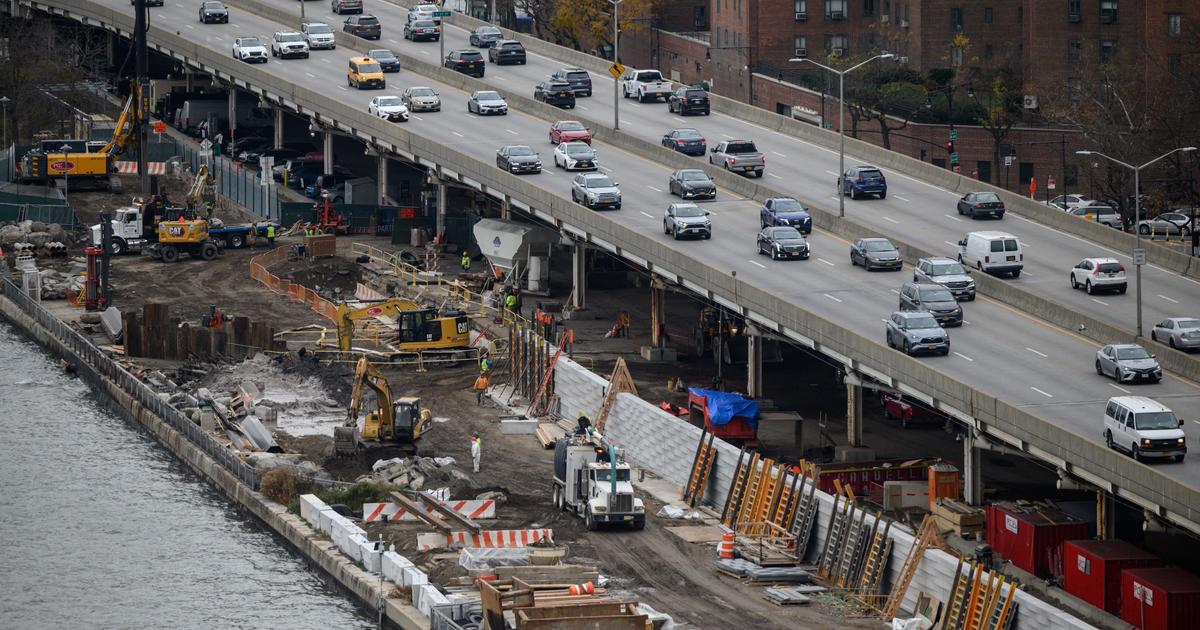Brooklyn-Queens Streetcar, New Solar Panels Among De Blasio's Plans In State Of The City Address
NEW YORK (CBSNewYork/AP) -- A new effort to keep the city's neighborhoods clean, more solar panels on city-owned buildings, and a new streetcar service along the East River waterfront in Brooklyn and Queens were among the efforts Mayor Bill de Blasio announced in his State of the City address Thursday night.
The efforts were part of a theme of bringing development and equal services to all city neighborhoods.
"Our vision means we have to use the tools of government to fight against inequality – and to fight for a strong future for all our families," de Blasio said.
The new streetcar service – called the Brooklyn-Queens Connector, or BQX for short – will run from Astoria to Sunset Park and will have the potential to generate $25 billion in economic impact for the city, Mayor de Blasio said.
"New Yorkers will be able to travel up and down a 16-mile route that links a dozen waterfront neighborhoods," he said. "The BQX has the potential to change the lives of hundreds of thousands of New Yorkers."
The total length would be approximately 16 miles along the East River waterfront that stretches between the two boroughs, primarily in a dedicated lane the city says would avoid conflict with general traffic.
Officials estimate the route would shave about 18 minutes off a commuter's typical weekday trip compared to current transit options.
Neighborhoods like DUMBO have been booming with development, but public transportation development has not caught up. The streetcar fare would be a single-ride MetroCard.
"This is about equity and innovation," de Blasio said in a statement. "We are mapping brand new transit that will knit neighborhoods together and open up real opportunities for our people."
The streetcar line is estimated to cost $2.5 billion, less than a new subway line.
The new streetcar is still several years down the road. There will have to be community outreach and other work done before construction would start in 2019 or 2020.
"It's something that I think is going to make a huge impact for hundreds of thousands of people," de Blasio said on "Erbo in the Morning" on Hot 97. "We're talking about neighborhoods that are growing in terms of population, we're talking about neighborhoods that have more and more jobs in them."
The mayor also announced a push to boost solar power capacity in the city as part of a commitment to cut greenhouse gas emissions.
As part of the new initiative, the panels will be placed on 88 additional buildings, including 66 schools, the Queens Museum, Bellevue Hospital and the Abe Stark Ice Skating Rink on Coney Island, aides said previously.
Currently, 35 city-owned buildings have solar installations, producing nearly 5 megawatts of power, up from 0.7 megawatts when de Blasio took office in early 2014. A megawatt can power more than 150 homes, according to the U.S. Department of Energy.
The new plan will add 19 megawatts. The mayor's aides said it will help the city reach its goal of generating 100 megawatts of renewable energy in public buildings by 2015.
The solar construction, part of an effort to retrofit all public buildings to make them more environmentally friendly by 2025, will be partly funded through a power purchasing agreement that allows the city to avoid up-front costs, aides said. The existing solar installations have created about $1.2 million in annual savings, according to city statistics.
The mayor also announced the new CleaNYC program, which he called "a revitalized effort to keep our neighborhoods clean in all five boroughs."
As part of the program, the city will add Sunday and holiday pickup service for more than 5,000 litter baskets in busy neighborhoods, expand cleaning of highway ramps and shoulders, and double down on blasting graffiti.
The mayor further announced plans for a revival of Governors Island, which the mayor said would create tens of thousands of jobs and create a new research and cultural campus.
"It will create a place where a young biomedical scientist might develop a cure for diabetes, or a tech entrepreneur might innovate a gravity-powered light bulb," de Blasio said.
And for commuters, the mayor announced plans for 350 new real-time countdown clocks for city buses in all five boroughs, of "the same kind of clocks many straphangers already know and love underground." For motorists, paper dashboard receipts for parking meters will be a thing of the past as drivers will soon be able to pay their meters on their smartphones.
De Blasio also noted the achievements his administration has already accomplished, including paid sick leave, a guaranteed minimum wage of $15 per hour for 50,000 city workers and contracted workers, and six weeks of paid leave for parents for about 20,000 city workers.
But he said paid parental leave cannot be limited, calling for a statewide law.
"It's time this country caught up with the rest of the world to create a national policy that eliminates the choice between paying the rent and taking the once-in-a-lifetime chance to bond with a new baby," he said.
De Blasio also emphasized what he said was a dramatic drop in overall crime, saying "New Yorkers are safer now than they've been at any point in modern history." And safety will be strengthened since the City Council has agreed to add 2,000 officers to the beat by the end of the year – in the first increase in patrol strength since 2001.
But he also noted the need for stronger bonds between police officers and communities, and announced a plan titled "One City, Safe and Fair, Everywhere" to achieve that goal.
"It's our blueprint for real neighborhood policing—something that's been talked about for decades and will now be achieved," de Blasio said.
Neighborhood policing will be added to 11 more precincts by the summer, and will eventually be the norm throughout every city neighborhood, de Blasio said.
"Let's be forthright. This is a fundamental shift for some neighborhoods that bear scars of a difficult history between police and community," the mayor said. "It asks the people of our neighborhoods and the police officers sworn to protect them to do the work of building trust."
De Blasio also said officers would be trained to "help overcome the biases that reside in all of us."
"This spring, we will introduce 'implicit bias' training for our officers—helping them identify, understand and change unconscious behaviors that may affect their policing," de Blasio said. "All of the training and technology we are delivering to our police department will help every one of our 35,000 uniformed officers become the kind of cop they signed up to be."
He also credited the Vision Zero traffic safety program with also saving lives, noting that traffic fatalities are down 22 percent since 2013, and that the city is working to make the roads safer still by repaving 2,200 lane miles of city roads and filling nearly a million potholes in the past two years.
The mayor further called 2015 "one of the best years ever for affordable housing" in New York City, with a record number of new affordable apartments and the first ever rent freeze for rent-regulated units, among other achievements.
He said upgrades are also coming to numerous public housing developments, from repairs to leaky roofs to high-speed Internet access. Further, the mayor said the city has fought to address the city's homelessness crisis – moving more than 22,000 New Yorkers from shelters to permanent housing and launching the HOME-STATE homelessness outreach program.
And in an effort to eliminate the stigma of mental illness, First Lady Chirlane McCray is leading ThriveNYC – which the mayor called the most comprehensive program in any American city - to help New Yorkers with mental health problems.
In the sphere of schools, the mayor said his administration is "shaking the very foundations of public education," with advanced placement classes in all high schools, algebra in all middle schools, and computer science for every grade level. He said the city is working to turn around the tragic trend of the school-to-prison pipeline that has plagued many students.
De Blasio broke with tradition in delivering this year's State of the City address. Instead of delivering the annual speech in the afternoon, he delivered the address at night in the hopes of landing more television and Internet livestream viewers.
(TM and © Copyright 2016 CBS Radio Inc. and its relevant subsidiaries. CBS RADIO and EYE Logo TM and Copyright 2016 CBS Broadcasting Inc. Used under license. All Rights Reserved. This material may not be published, broadcast, rewritten, or redistributed. The Associated Press contributed to this report.)



